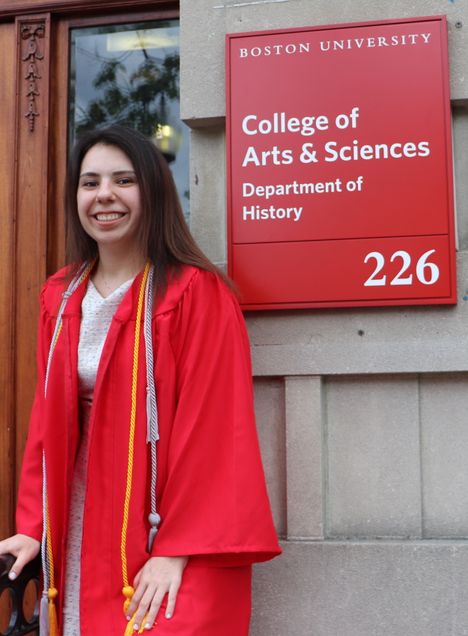Alumni Profile, March 2020
Anna Stroinski—CAS ’19
 What have you been doing since leaving the History Department?
What have you been doing since leaving the History Department?
I haven’t gone far from 226 Bay State Road (just a few blocks inbound!) to work as the Administrative Coordinator at the BU Department of Religion. On the side, I freelance as a researcher and writer, having worked on projects ranging from a documentary script on municipal socialism in Haverhill, MA to a commissioned article on the pros and woes of digital archives. In my free time, I read and review interesting scholarly monographs on my not-quite-as-interesting Medium blog.
How did your experience in the department shape your professional and personal life?
To say that my experience in the department shaped my professional trajectory is a bit of an understatement; I want to do what I want to do–go to graduate school, most’ve all–because of my history coursework and senior thesis experience. The department always felt like a community to me, a place to not only grow as a scholar of history but as a person writ large, and to have that sense of support was invaluable as a (very shy) undergraduate. It’s also very true that I’ve made lasting relationships with department students, faculty, and staff. I am and will continue to be 226’s biggest fan!
What interactions with members of the History faculty did you value most during your time in the department?
Professor Alexis Peri’s Imperial Russia course was the first history class I took when I was toying around with the idea of becoming a history major. A week in, I was hooked. Professor Peri continued to mentor me through various projects–an oral history of post-communist nostalgia in Poland which, two years later, turned into a short documentary project–and instilled in me the notion that history can and in fact should be an extrodinarily personal affair. Professor Phillips and Professor Schulman also helped guide me through my senior thesis project over the summer and during the 2018-2019 academic year. I often tell people that Professor Phillips knew what my argument was before I did, and Professor Schulman pushed me to sharpen my thoughts and emphasize the more innovative sections of my paper. Finally, Professor Charles Capper’s American Thought and Culture II course is what cemented my passion for modern American history and intellectual history more broadly. His curated intellectual history sourcebook was the perfect introduction to what one might consider a national reckoning after the Civil War–to some, a period of rebirth but to others the end of an age of innocence.
If you could give a piece of advice to your past self, what would it be?
Cut yourself some slack!